Under current conditions, livestock exports by sea must stop immediately
Currently, only 64 livestock carriers are permitted to load European animals on EU-ports to then export them to third countries. This at least 1.5 billion € worth trade is carried out on substandard and overcrowded ships.
In response, the German animal welfare organization Animal Welfare Foundation e.V. (AWF) together with the French environmental organization Robin des Bois, publish a comprehensive report on the seaworthiness, safety, environmental compatibility, and suitability for health and animal welfare of livestock carriers trading from the European Union.

The figures and this film speak volumes: the transport of live animals on decrepit vessels across the sea must end immediately. At the very least, compliance with internationally binding standards is necessary. The European Union and its Commission must finally take responsibility in this process after another three years of crippling inaction.
"Three years ago, the European Commission received our initial joint report on 78 EU-approved livestock carriers. This year's report shows that the EU and its Commission have fallen into unacceptable inaction over these three years, doing so against the recommendation of their very own inquiry committees.
Today, this reality prevails: the average livestock carrier is an almost 43-year-old vessel held together only by rust and hope. Formerly, it served as a general cargo carrier, car carrier, reefer, or container ship but its safety was no longer sufficient for that initial purpose. However, this doesn't seem to be an obstacle for the transport of live animals. Animal welfare is never a consideration in the use of these vessels, and seaworthiness and safety are also ignored. Transporting live animals by sea must not continue on these unseaworthy, unworthy, and simply dangerous vessels."
The current standard: flying under a black flag
Even in 2024, nearly half of the EU-approved livestock carriers are flying the flag of a country listed by the Paris Memorandum of Understanding (Paris MoU) as a black flag (for example Togo, Sierra Leone or Tanzania). This means that the vessels pose an extraordinarily high risk to maritime traffic, as well as to the lives of the animals and crew on board, and to the environment. Even vessels flying a grey flag still suffer so many deficiencies and risks that some of these vessels have been detained in ports up to 10 times. However, a permanent ban on these black and grey-flagged vessels, justified due to their immense deficiencies, has not been implemented between 2021 and 2023 and to this day.
"In the shipping industry, vessels that are subject to detention due to deficiencies are taken out of operation and scrapped. Their vessel risk profile is unacceptable, and they are identified in ports and typically targeted by inspectors. When it comes to live animal transport, there seems to be a consensus to avoid doing just that. Three years ago, 17 vessels were identified as posing a significant risk. 15 out of these 17 vessels are still EU-approved. This situation is completely unacceptable; scrap vessels flying grey and black flags must be immediately taken out of operation. We call on the EU and its Commission to take immediate action."
Disasters are piling up
Among the 64 EU-approved livestock carriers, AWF and Robin des Bois only find 4 vessels that were originally built as livestock carriers. All other vessels have been converted after around 30 years at sea. The film shows that sharp edges, rust, and defective struts, as well as excessively steep ramps, lead to the health and welfare of the animals on board never being guaranteed at any time.
Thus, one disaster follows another in the maritime history of animal transport. Scenes like those recently witnessed on the AL KUWAIT or the BAHIJAH in the Red Sea are also commonplace in European waters, drastically seen with the ELBEIK and KARIM ALLAH in recent past. Thousands of animals spend weeks on their floating prisons, standing ankle-deep in their own excrement, exposed to heat, noise, rough seas, crowding, disease, and ultimately, death.
Now it's time: Only white flags on Europe's seas
Maritime EU live animal exports with these old, rusty, end-of-life, and dangerous ships must come to an end. If this export continues anyway, it should only be conducted on IACS-certified and therefore white-flagged vessels, which can at least guarantee the most basic safety measures for animals and personnel on board. Black and grey flags must be prohibited in the new EU animal welfare transport regulation - vessels flying these flags pose an unacceptable risk.
Iris Baumgärtner, AWF project lead, and Charlotte Nithart, Robin des Bois-Head of Campaigns, deliver a clear message: "It's been three years since the last joint report by AWF and Robin des Bois. Three years in which the suffering of animals on board of defective vessels has been simply accepted. Three years in which the EU and its Commission have done nothing. Over these three years, one thing has become even clearer: EU legislation must finally confront the brutal reality of live animal transport by sea and take action. Because no animal belongs on a ship, and it cannot and must not continue like this."
Paris MoU:
The organisation consists of 27 participating maritime Administrations and covers the waters of the European coastal States and the North Atlantic basin from North America to Europe. Its mission is to eliminate the operation of sub-standard ships through a harmonized system of port State control. Annually more than 17,000 inspections take place on board of ships in the Paris MoU ports, ensuring that they meet international safety, security, and environmental standards, and that crew members have adequate living and working conditions.
IACS (International Association of Classification Societies):
IACS is a not-for-profit membership organisation comprising 13 Class Societies from around the world. A classification society provides classification, statutory certification and services as a Recognised Organisation acting on behalf of a flag Administration, and assistance to the maritime industry and regulatory bodies as regards maritime safety and pollution prevention, based on the accumulation of maritime knowledge and technology.